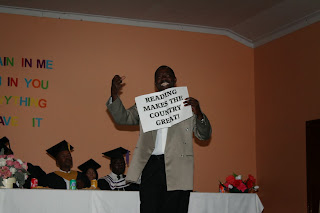I can say that it’s been an adventure. I’ve done many new
things (eaten donkey, gone to a wedding, led a youth group…taught a class) but
in many ways, it’s not so different from home. I’ve built up my family and
friends, and I definitely feel like I belong to my community here.
I had a crazy moment last week, though: Thursday night was
our annual academic achievement awards ceremony. It was the first event I was
here for last year, too. In this evening, we award learners with certificates
for outstanding academic achievements, improvements, and other things (sports,
behaviour, commitment). I remember last year being horribly bored watching the
ceremony, and also feeling bad for not being able to help control the kids from
the audience (where I was standing to take photos).
Our pastor giving the Keynote Address
This year was different. The 3 hour ceremony honestly felt
like nothing. I felt like a proud parent, smiling all the time and mouthing
directions and taking billions of photos of my kids. (Sorry Mom for rolling my
eyes when you “played the piano” with me in my performances and stuff…)
Some of our top academic achievers
More importantly, I feel more successful as a teacher now.
To start with, I was actually able to help keep the kids in the audience under
control when they needed to be. But further – and this is my crowning victory
of the last month or so – I have discovered that I am one of the teachers now.
The only awards I, personally, handed out - to the "Sportsmen" and "sportswomen" who are good leaders, athletes, and teammates.
I helped choose the new prefects, I helped choose learners
for the awards, I helped make the awards. And my input was taken on different
issues. I have been trying pretty hard to follow Peace Corp’s policy on only
intervening when your help is asked for, but I felt like there was a glaring
problem with our Awards Ceremony programme. You see, in the 49 years of my
school’s history, only Head Boys have given a speech at it.
But we have a Head Boy and a Head Girl. And let me just tell
you, the Head Girl this year is way more competent, and a much better speaker,
than the Head Boy. So for the first time since I’ve been working here, I
straight-up argued with my colleagues for hours until they let me add a Head
Girl speech to the agenda.
Our new Head Girl for the 2014 school year giving her speech!
I know one speech won’t change gender relations; it’s not
even a drop in the bucket. But at least we’re trying, right? There is so much
male superiority happening in this place, and that extends to the learners.
Hopefully if we can continue to make changes, even small changes like this one,
to the way we interact at school, we will be able to help some of these girls
grow up to be self-confident and capable individuals!















